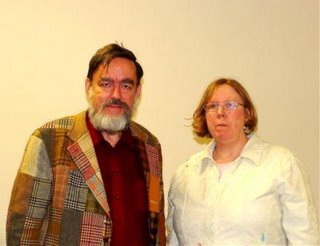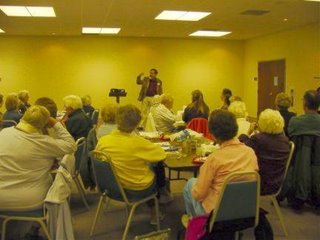Serving as a judge at the Poetry Out Loud State Contest was an unexpected honor and pleasure. The event included judges and staff Grace Wenz, Esther Kaplan, Melinda LaBarre, Dennis Rendleman and me from the Regional Contest and added new judges John Knoepfle from Springfield and Susan Guthrie from Chicago. As with the Regional Contest, on hand were an acurasy (make that
accuracy) judge who had the texts of the poems in front of her during the reciting and a prompter, also with poems in view, who provided words to reciters who could not remember the words and needed a prompt, the first word or two of what followed.
. . . . Contestants were Springfield Regional winners,Aren Dow, Kaitlyn Sanders plus Bueana Cox, Sharee Glenn, Sydney Jones, Ariela Rotenberg and Brandon Sidney, winners from the Chicago Regionals.
. . . . Most of these young people were dressed as though they had just stopped by during a regular day at school, but a few were attired as though they were going to be facing an audience in a competition of some significance. I had seen no words in print describing appropriate clothes for the contests, there was no mention of appearance in the judges' guidelines, and the obvious difference between those who dressed for the occasion and those who did not absolutely did not affect my evaluating them as reciters of poems. Did it make a difference in how I reacted to them as people? Absoutely. As a judge,
could I,
did I talk with those who acknowledged with their attire the importance of the State Contest and congratulate them for their astuteness of character and dedication? Absolutely not. But if they, or people who know them and saw them read these words, I hope word will get passed to those exceptional students. Regardless of whether or not the organization credits clothes for contributing to the presentation, those who strive to deliver
maximum positive impact to the audience should keep appropriate togs in mind. Truth is, poetry is about words delivered; not about shirts and shoes. So appearance is not a consideration; right?
. . . . Wrong. How the presenter carries himself/herself matters. Consider the hands: open, pointing, clenched, hanging loosely or joined at the front as though competing in a spelling bee. Consider the arms : in motion in harmony with stance and inclination of the head, are factors in judging. And what about those feet? Are they motionless, with legs together and hands joined? For a long time, traditional poetry readers and reciters have conformed to what I call the spelling bee pose, a time-honored classic, possibly Greek or Roman or Victorian mandate, because that's what was the
norm, the preferred way to share poems. Didn't matter if the poem was about a barn fire with horses dying or a rabbit's loosing race with a hawk or a lover's lament over rejection by the woman who was queen of his domain, the classic stance has been the "rule" for sharing poetry.
. . . . The art of sharing poetry out loud has evolved since ancient Greece when poets competed as stridently as athletes in periodic national contests. Poetry Out Loud organizers acknowledged this by noting the expectation of a "theatrical" element in the reciting. Vachel Lindsay used the theatrical element in his recitals to packed theaters and auditoriums in the late nine-teens and twenties. He called is presenting the "higher vaudeville," and though his description was accurate for its time, today's poets relate to higher vaudeville as they might relate to a hand crank for starting your Toyota Camry or a running board. I call the business of sharing poetry out loud, virtually the same criteria used by Poetry Out Loud, Unleashing the Poem. I won't expound about that here. Suffice to say, most of the poets in the State Contest proved they knew what contemporary poetry presentations should be because they
did it! Some
exceptionally well!
. . . . The first poet stumbled four or five times, forgetting words and pausing with a nod in the direction of the prompter for some help. She was the
only poet to experience such difficulty so obviously, and it occurred only during her first reading. During the second and final rounds she shone like the sun. Based on the forms distributed to the judges, I had no option other to evaluate the talented young lady on the criteria included on the judges' forms. Her score for that heart-in-your-throat first recital was higher than it would have been in a contest where memorizatiion mattered.
. . . . Judges' evaluation criteria were the same in the State Contest as for the regional. There was no place for evaluating the level of memorization or for regular judges to mark deductions for lapses in memory. I hope Poetry Out Loud reconsiders this and adds such capacity to future judges' reciter evaluation forms. One of the judges remarked after the contest that failure to memorize a poem adequately, and stumbling during the presentations was not a big deal, but I disagree. Without MEMORIZATION, a major pillar in the foundation of poetry reciting crumbles like saltwater concrete. If a person has stage fright, the place to eliminate those butterflies is in
practice sessions, the countless rehearsing until the words are second nature.
. . . . Memorizing the words are only the first part of the process that leads to competition. It's the
first part to master. Everything else -- stance, volume, gestures, speed. . . -- follows. Why? Because in fine tuning the recital, the memorized poem becomes even more imprinted on the mind. By the time a person recites a poem for the first time, he or she should be able to say the poem aloud while playing volleyball and not miss a word.
. . . . Two rounds of recital led to determining the four finalists based on those scores. The results were no surprise. Finding four top finishers from a field of
seven was not a process the regular judges were not in on, and rightfully so.
. . . .
BUT, instead of seven reciters at the State Contest, there should have been 37. A small point; a wish. It was the first effort. I'm confident the number next year will be higher. Judges were instructed not to base their final round score on the total impression made during the first two rounds added to the final round, but on the basis of the final round alone. The young lady who had suffered passing memory lapse at the very start of the contest was on the same footing as the other three finalists. Round three was clearly the cream of the cream in poem choice and in delivery.
. . . . The wait for the results . . . . . . . was a nail biting time. I had a favorite, whom I expected to win, but my hands became cold and clammy during the wait, which was not long. The final tabulators were superb.
. . . . "And the runner up is . . . . (inhale) . . . . . . . . . Springfield's Kaitlin Sanders . . . . . . . and the winner is . . . . . . . . . . . Chicago's Ariela Rotenberg (
EXhale!. . . . . Ariela will attend the national competition May 16. WOW! Sweet satisfaction. Expectations met!
. . . . I talked with Ariela and her mother during the luncheon that followed and learned the whole experience had begun for her in March 2006. She had memorized two poems for the regional and memorized a third after she won there. Her final-round poem was one she had presented at the regionals. She went with what she was most comfortable with, and her delivery had been absolutely first class!
. . . . So WOW! What a contest! I wish I could be present in Washington, DC when Ariela takes to the stage again, but even though I won't be there, my heart will be front row center. I was impressed with every contestant I was privileged to see and hear at regional and state this year. And I look forward to next year's competition. Kudos, congratulations and thanks to Penny Wollan-Kriel, Springfield Area Arts Council, Illinois Arts Council and everyone else who was a part of Poetry Out Loud 2006!








